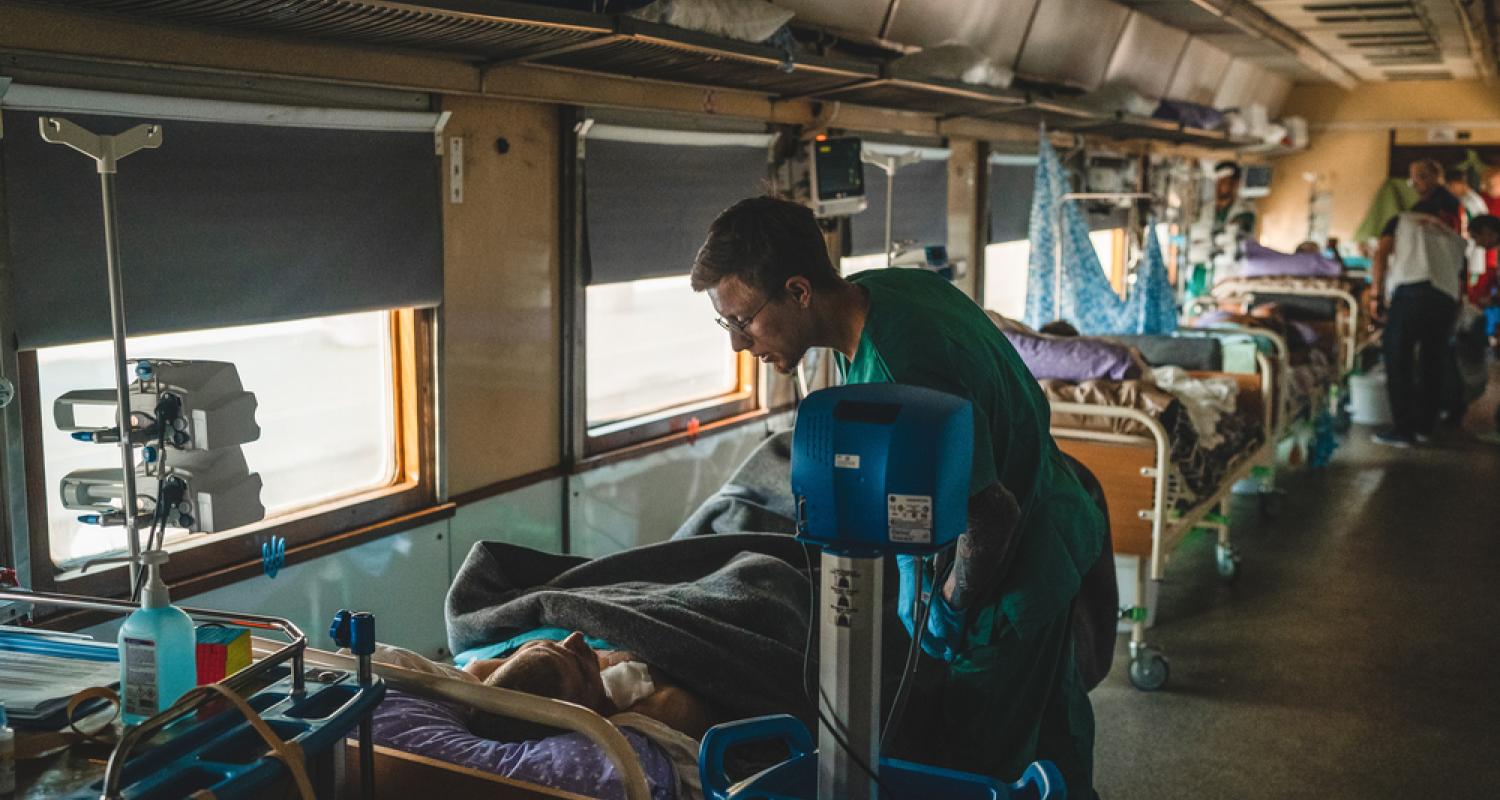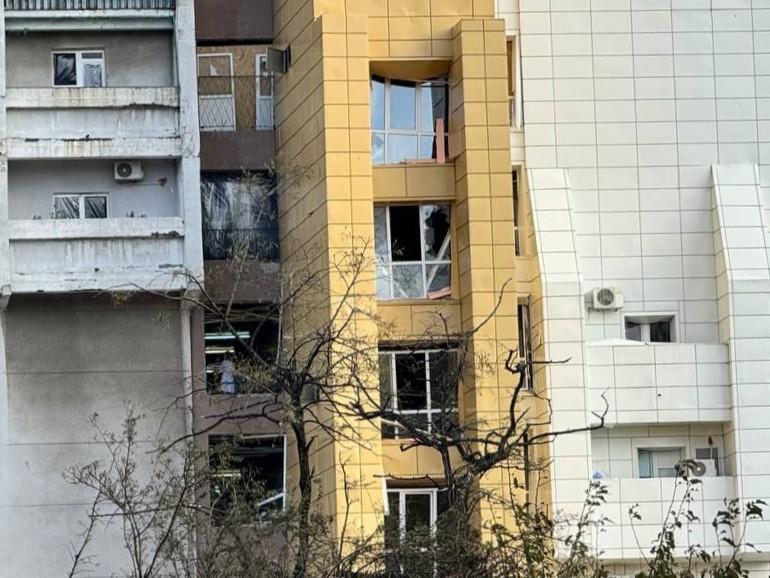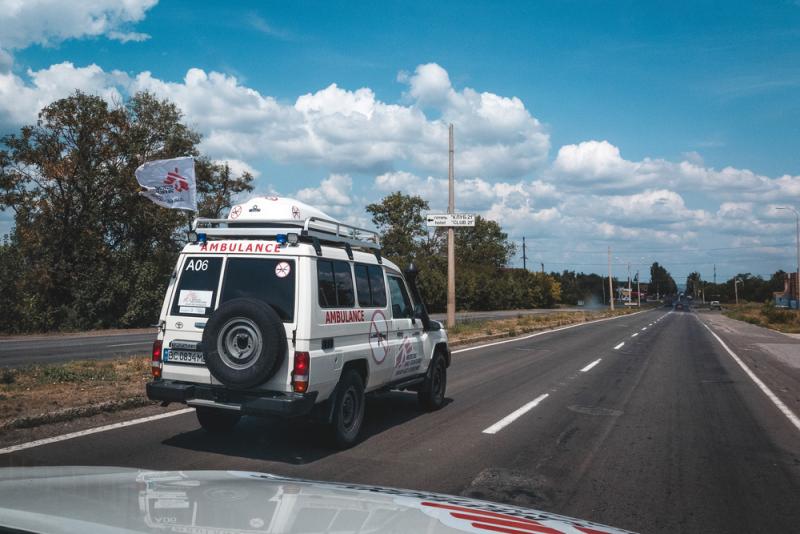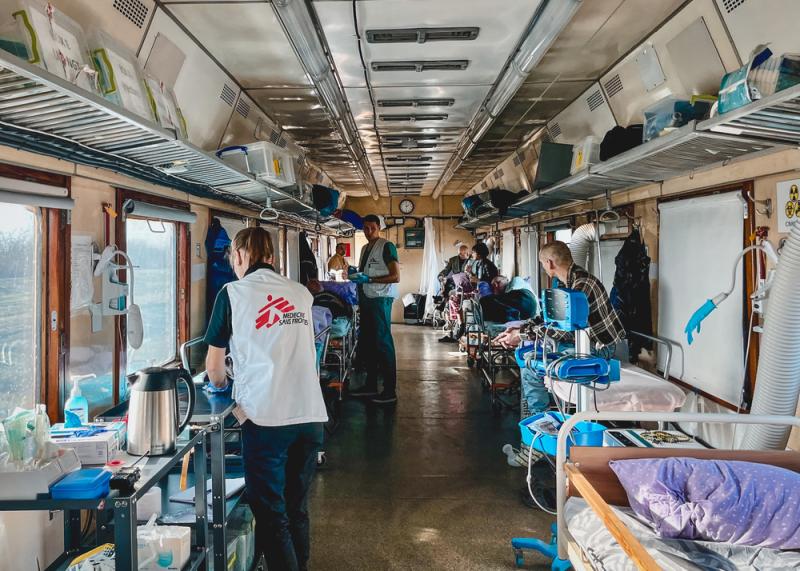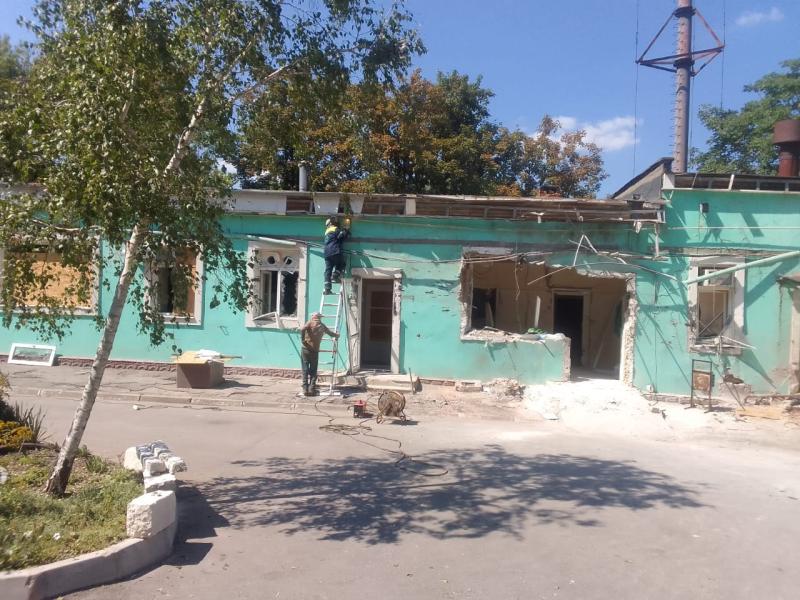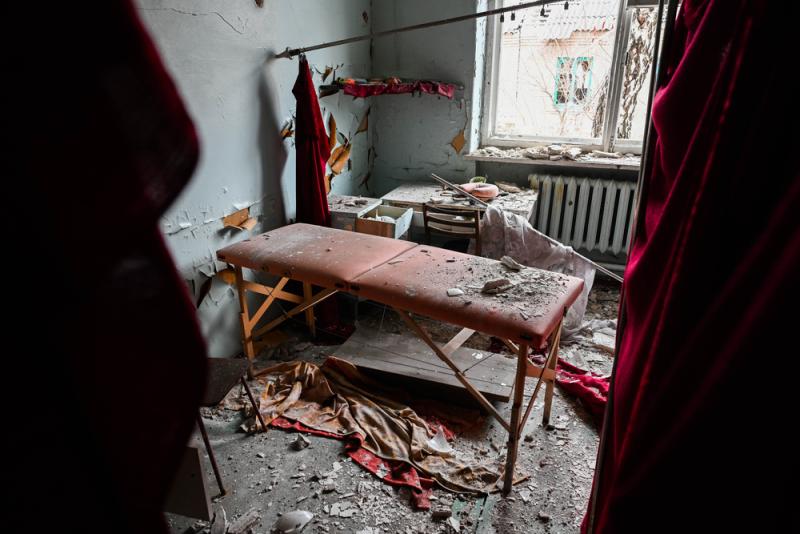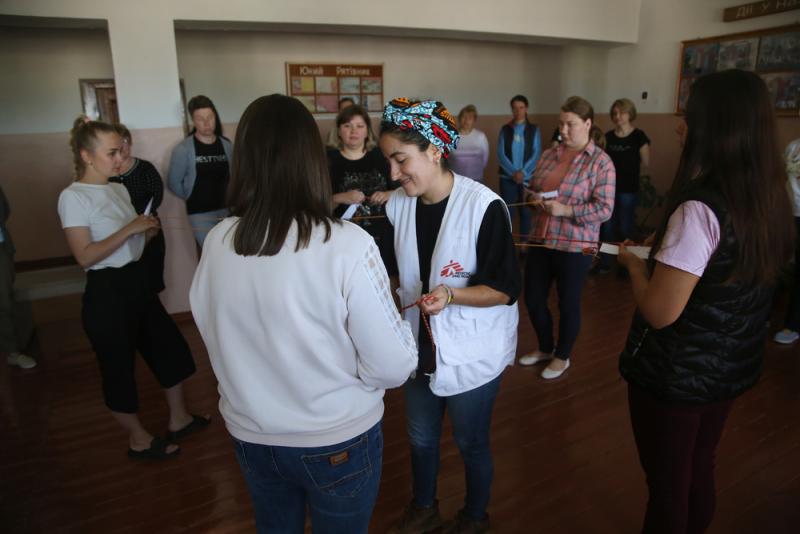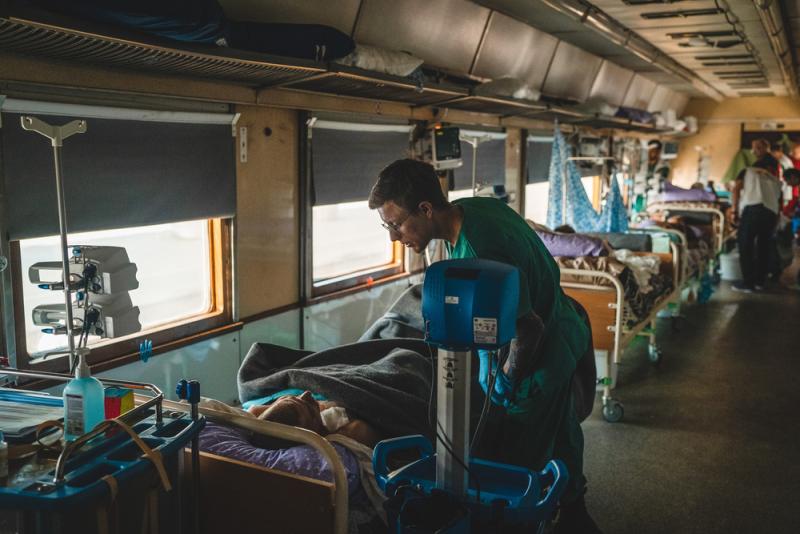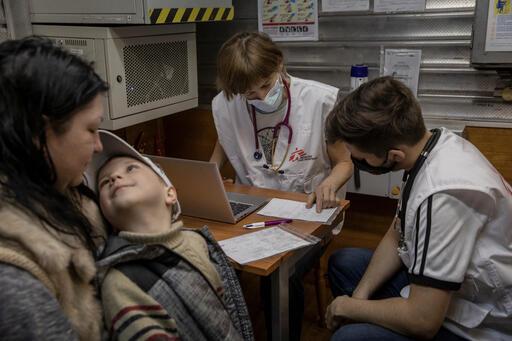Doctors Without Borders is responding to the crisis in Ukraine
Latest Update
To date, Doctors Without Borders teams have only been allowed entry into regions controlled by Ukrainian forces, which means they have witnessed the destruction caused by the war in Ukrainian-held territory only. Despite efforts to obtain permission to access regions under Russian occupation, this access has not been granted; Doctors Without Borders has therefore been unable to observe the situation in areas under Russian military control.
In a report titled Between Enemy Lines, Doctors Without Borders reveals the massive and widespread destruction of health facilities in Ukraine, and the severe impediments to medical care under Russian military occupation.
Will you support our crisis response?
You can help our medical teams deliver emergency medical supplies and treatment to people in Ukraine by making a donation today.
How we are responding in Ukraine
More than a year after Russian forces launched attacks on multiple cities in Ukraine, the intense fighting has led to a severe humanitarian crises and the displacement of millions of Ukrainians, within and outside the country.
Doctors Without Borders continue to provide care for war-wounded patients in emergency departments, and referral ambulances. We also run mobile clinics and provide support to health facilities.
Specifically, our current response includes:
- Medical referrals and evacuation by Doctors Without Borders ambulances.
- Supporting the emergency care and intensive care unit as well as supporting the surgical capacity of hospitals near the frontlines in the Donetsk and Kherson regions.
- Physiotherapy and post-surgery care, and psychological support for war-wounded and injured patients, as well as physiotherapy trainings for staff in rehabilitation wards at hospitals supported by Doctors Without Borders teams.
- Mobile clinics teams providing primary healthcare, mental health counselling and psychoeducation services, as well as sexual and reproductive healthcare, particularly in areas close to the frontlines.
- Medical donations, including medical kits, equipment and medicine to hospitals and medical facilities with shortages.
- Trainings about secondary healthcare, including mass casualty trainings, pain management trainings and mental health to healthcare staff.
You can support our medical response in Ukraine by making a donation today
- EASTERN UKRAINE
Kharkiv region
The ambulance teams are doing medical referrals from Kharkiv to hospitals of other cities, which are less overwhelmed with wounded patients. Doctors Without Borders opened an ambulance base in Kharkiv city, and mobile clinics operate in some settlements close to Donetsk region border.
Donetsk region
In Pokrovsk hospital, our ER team provides support during mass casualty incidents as well as in the operating theater. An ambulance service also conducts referrals from Pokrovsk, Kostiantynivka, Sloviansk and other cities in Donetsk region.
Dnipropetrovsk region
Doctors Without Borders set up an office and a pharmaceutical warehouse, which ensures the operation of mobile clinics and emergency teams.
- SOUTH UKRAINE
Mykolaiv region
Our teams operate mobile clinics in the settlements close to Kherson region.
Kherson region
The Doctors Without Borders medical team is supporting the hospital in Kherson in the intensive care, surgical and traumatology departments, along with state doctors. Mobile clinic teams also operate in the settlements of the Kherson region, including TB-screening.
- CENTRAL UKRAINE
Vinnytsia
MSF started providing specialised psychotherapeutic services for people experiencing war-related post-traumatic stress disorder (PTSD) symptoms. The centre also supports local hubs for displaced people with health promotion and mental health group sessions.
Cherkasy
Doctors Without Borders runs physiotherapy and post-surgery care, and psychological support for war-wounded and injured patients, as well as physiotherapy trainings for staff in rehabilitation wards at hospital.
- AMBULANCE SERVICE
Doctors Without Borders set up 9 bases of ambulance teams in Snihurivka (Mykolaiv region), Apostolove (near Kryvyi Rih city), Dnipro, Pokrovske and Pavlohrad (Dnipropetrovsk region), Mezhove, Sloviansk (Donetsk region), Zaporizhzhia (Zaporizhzhia region) and Kharkiv city (Kharkiv region).
Doctors Without Borders ambulance teams refer patients to other hospitals where patients can receive the appropriate and specialised care. Near the frontlines in the east and south, the healthcare system is struggling to cope with both the old and new emerging medical needs caused by the fighting.
- OTHER ACTIVITIES ACROSS UKRAINE
In the first semester of 2024, Doctors Without Borders had made donations totalling over 900,000 euros. More than half of this amount was allocated for the purchase of medicines and medical equipment for hospitals near the frontline and those affected by shelling. The remaining funds were used to buy construction materials, tools and generators for restoring hospitals damaged by shelling in the Donetsk, Kherson, and Dnipropetrovsk regions, as well as fuel for medical transport. Additionally, donations included drinking water, personal hygiene kits and blankets for patients and internally displaced persons.
Doctors Without Borders also conduct training sessions on first aid, mass casualty response, pain management, and psychological group sessions for partner organisations.
Since the outbreak of fighting across the country, our teams have been working to mount a response to meet urgent needs. We currently work with approximately 22 international staff in Ukraine and employ around 22 Ukrainian staff. They work as medical staff (doctors, nurses); psychologists; logistics and administration; and management. (Updated in August 2024)
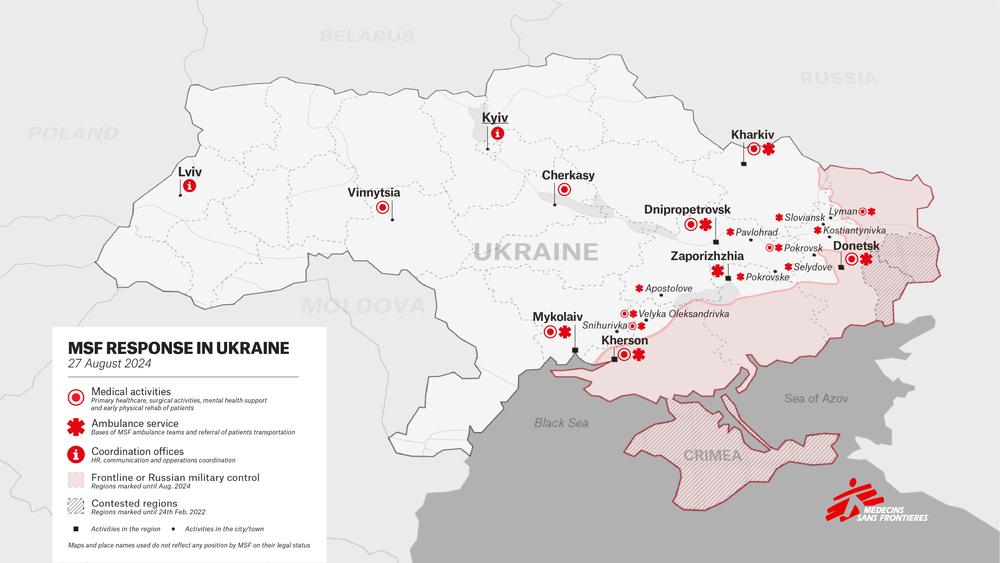
Map of Doctors Without Borders response in Ukraine as of 27 August 2024.
- Poland
More than 11.7 million people have crossed from Ukraine into Poland since 24 February 2022 (UNHCR). More than 1.6 million people have registered for temporary protection.
Doctors Without Borders is actively working to support the Ministry of Health to ensure that patients are able to access treatment for drug-resistant tuberculosis, including patients previously supported by Doctors Without Borders in Ukraine.
- Russia
Over 2,850,000 people have crossed to Russia from Ukraine as of 31 December 2023 (UNHCR).
Doctors Without Borders has been present in Russia for more than 30 years. Most recently, our teams in Russia worked with regional health authorities to support crucial, life-saving treatment for patients with drug-resistant tuberculosis (DR-TB). Doctors Without Borders together with its partner organizations in Moscow and St Petersburg provided assistance to people living with HIV and hepatitis C, including those who crossed from Ukraine into Russia.
Since the start of the international armed conflict, Doctors Without Borders has been supporting people displaced to the southern regions of Russia who found themselves in Voronezh, Belgorod and Rostov regions. In close collaboration and partnership with local NGOs, Doctors Without Borders organized teams of local social workers, medical consultants and psychologists, to ensure that people displaced from their homes, mostly newly arrived ones, receive all the necessary qualified medical services in licensed medical clinics and have access to other state healthcare and social services.
In August 2024, Doctors Without Borders received a letter from the Ministry of Justice of Russia, with the decision of withdrawal of Doctors Without Borders from the Register of affiliate and representative offices of foreign NGOs, and consequently had to conclude its operations in Russia.
Our emergency response in neighbouring countries
Support our medical response
You can help our medical teams deliver emergency medical supplies and treatment to people in Ukraine by making a donation today.
